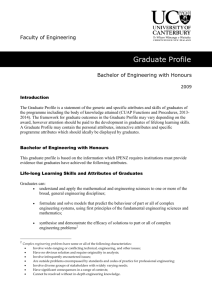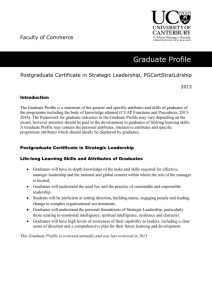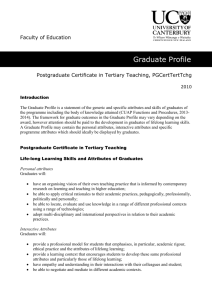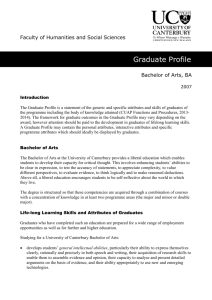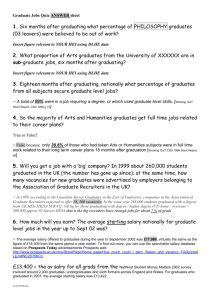Faculty of Engineering Destination Summary Report: May 2009
advertisement
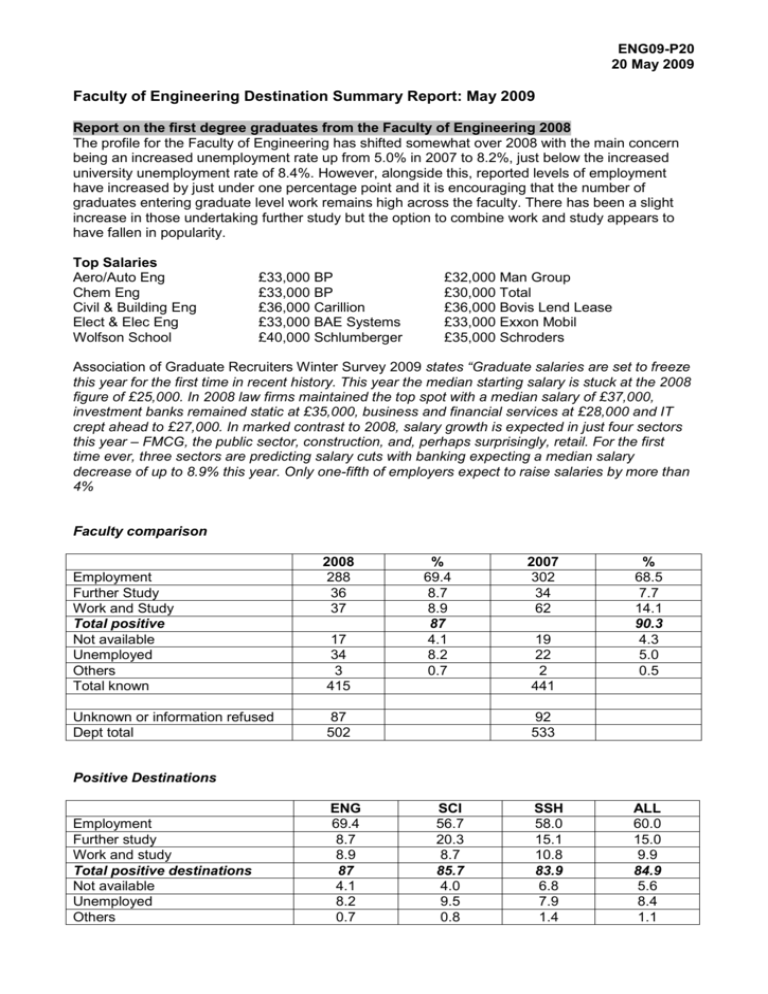
ENG09-P20 20 May 2009 Faculty of Engineering Destination Summary Report: May 2009 Report on the first degree graduates from the Faculty of Engineering 2008 The profile for the Faculty of Engineering has shifted somewhat over 2008 with the main concern being an increased unemployment rate up from 5.0% in 2007 to 8.2%, just below the increased university unemployment rate of 8.4%. However, alongside this, reported levels of employment have increased by just under one percentage point and it is encouraging that the number of graduates entering graduate level work remains high across the faculty. There has been a slight increase in those undertaking further study but the option to combine work and study appears to have fallen in popularity. Top Salaries Aero/Auto Eng Chem Eng Civil & Building Eng Elect & Elec Eng Wolfson School £33,000 BP £33,000 BP £36,000 Carillion £33,000 BAE Systems £40,000 Schlumberger £32,000 Man Group £30,000 Total £36,000 Bovis Lend Lease £33,000 Exxon Mobil £35,000 Schroders Association of Graduate Recruiters Winter Survey 2009 states “Graduate salaries are set to freeze this year for the first time in recent history. This year the median starting salary is stuck at the 2008 figure of £25,000. In 2008 law firms maintained the top spot with a median salary of £37,000, investment banks remained static at £35,000, business and financial services at £28,000 and IT crept ahead to £27,000. In marked contrast to 2008, salary growth is expected in just four sectors this year – FMCG, the public sector, construction, and, perhaps surprisingly, retail. For the first time ever, three sectors are predicting salary cuts with banking expecting a median salary decrease of up to 8.9% this year. Only one-fifth of employers expect to raise salaries by more than 4% Faculty comparison Employment Further Study Work and Study Total positive Not available Unemployed Others Total known Unknown or information refused Dept total 2008 288 36 37 17 34 3 415 % 69.4 8.7 8.9 87 4.1 8.2 0.7 87 502 2007 302 34 62 19 22 2 441 % 68.5 7.7 14.1 90.3 4.3 5.0 0.5 92 533 Positive Destinations Employment Further study Work and study Total positive destinations Not available Unemployed Others ENG 69.4 8.7 8.9 87 4.1 8.2 0.7 SCI 56.7 20.3 8.7 85.7 4.0 9.5 0.8 SSH 58.0 15.1 10.8 83.9 6.8 7.9 1.4 ALL 60.0 15.0 9.9 84.9 5.6 8.4 1.1 Specific departmental performance Aeronautical & Automotive Engineering Employment rate increased in 2008, with 75.6% of graduates starting full time work Drop of 11 percentage points in the number of those entering graduate level work Increase in graduates undertaking further study, including master’s, MPhil, PGCE and ATPL Fewer opted to combine study and work Chemical Engineering Number of known destinations has halved this year to 14 graduates 10 of those in full time employment are in graduate level roles The one student undertaking further study has remained within the department Civil & Building Engineering The percentage in employment remained relatively high at 66.7% 9.3% of graduates were unemployed compared to the very low figure of 1.6% in 2007 The majority of graduates combining work and study are employed in civil engineering and construction jobs and working towards professional qualifications. 93.3% of graduates entered graduate level positions with the majority of these working in jobs related to their degree course. Electronic & Electrical Engineering There has been a slight shift towards employment from further study within this period BAE systems remains a prolific employer, but graduates have secured roles across a range of sectors including nuclear, civil service, aviation, telecommunications and consultancy. Destination data indicates all but one of those reported as unemployed did not do an industrial year Wolfson School of Mechanical & Manufacturing Engineering The unemployment level rose to 6.7% but this remains under the increased Faculty level. Of the 11 graduates undertaking further study, eight remain within the School taking master’s qualifications. Those combining work and study has nearly halved but includes one undertaking officer training with the RAF, two preparing professional portfolios, three undertaking postgraduate study and one studying for the Chartered Financial Analyst qualification. Those moving into non-engineering graduate roles are working in accountancy, sales and teaching, whilst three have joined HM Forces.
